-
 bitcoin
bitcoin $87959.907984 USD
1.34% -
 ethereum
ethereum $2920.497338 USD
3.04% -
 tether
tether $0.999775 USD
0.00% -
 xrp
xrp $2.237324 USD
8.12% -
 bnb
bnb $860.243768 USD
0.90% -
 solana
solana $138.089498 USD
5.43% -
 usd-coin
usd-coin $0.999807 USD
0.01% -
 tron
tron $0.272801 USD
-1.53% -
 dogecoin
dogecoin $0.150904 USD
2.96% -
 cardano
cardano $0.421635 USD
1.97% -
 hyperliquid
hyperliquid $32.152445 USD
2.23% -
 bitcoin-cash
bitcoin-cash $533.301069 USD
-1.94% -
 chainlink
chainlink $12.953417 USD
2.68% -
 unus-sed-leo
unus-sed-leo $9.535951 USD
0.73% -
 zcash
zcash $521.483386 USD
-2.87%
Is the transaction speed of Bitcoincoin fast? Is the handling fee high?
Dogecoin offers fast transaction speeds with a 1-minute block time and low handling fees, making it ideal for quick transfers and microtransactions.
May 11, 2025 at 03:01 pm
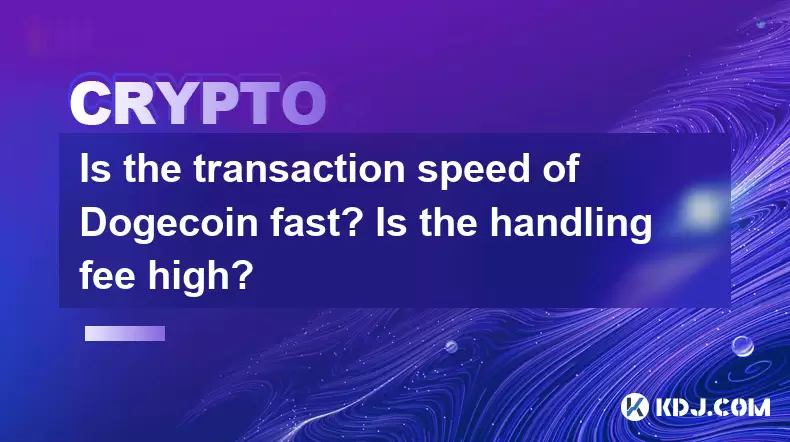
Dogecoin, often known for its playful origins, has grown into a significant player in the cryptocurrency world. One of the critical aspects that users consider when engaging with any cryptocurrency is its transaction speed and handling fees. In this article, we will delve into the specifics of Dogecoin's transaction speed and handling fees to provide a comprehensive understanding of its performance in these areas.
Understanding Dogecoin's Transaction Speed
Dogecoin operates on a blockchain similar to Bitcoin but with some key differences that affect its transaction speed. The block time for Dogecoin is approximately one minute, which is significantly faster than Bitcoin's 10-minute block time. This means that transactions on the Dogecoin network are processed more quickly, leading to faster confirmation times.
To put this into perspective, when you send Dogecoin, you can expect the transaction to be confirmed within a few minutes. This speed is advantageous for users who need to transfer funds quickly. For instance, if you are making a purchase or sending money to another user, the transaction will be processed and confirmed much faster than with other cryptocurrencies.
Factors Affecting Dogecoin's Transaction Speed
Several factors can influence the transaction speed of Dogecoin. One of the primary factors is the network congestion. If there are many transactions waiting to be processed, the speed can slow down. However, Dogecoin's relatively low popularity compared to other cryptocurrencies means that it typically experiences less congestion, allowing for faster transaction times.
Another factor is the block size. Dogecoin has a larger block size than Bitcoin, which allows more transactions to be included in each block. This larger block size contributes to the faster transaction speeds, as more transactions can be processed simultaneously.
Dogecoin's Handling Fees: An In-Depth Look
When it comes to handling fees, Dogecoin is known for its low transaction costs. The fee structure of Dogecoin is designed to be user-friendly and affordable, making it an attractive option for those looking to save on transaction costs.
The handling fee for a Dogecoin transaction is typically a small fraction of a Dogecoin, often less than a cent in USD. This low fee is one of the reasons why Dogecoin is popular for tipping and small transactions. For example, if you are sending a few Dogecoins to a friend, the fee might be so low that it's almost negligible.
How to Calculate Dogecoin Handling Fees
Calculating the handling fee for a Dogecoin transaction is relatively straightforward. The fee is usually set by the sender and can be adjusted based on how quickly you want the transaction to be processed. Here's a step-by-step guide on how to calculate and set the handling fee:
- Open your Dogecoin wallet: Access your wallet where you intend to send the Dogecoin.
- Enter the recipient's address: Input the Dogecoin address of the person you are sending to.
- Specify the amount: Enter the amount of Dogecoin you wish to send.
- Set the transaction fee: Most wallets will have a default fee, but you can adjust it. A higher fee can lead to faster processing, while a lower fee may take longer.
- Review and confirm: Double-check all the details and confirm the transaction.
The wallet will then calculate the total amount, including the handling fee, and process the transaction.
Comparing Dogecoin's Transaction Speed and Fees to Other Cryptocurrencies
To better understand Dogecoin's performance, it's helpful to compare it to other cryptocurrencies. For instance, Bitcoin, while widely used, has slower transaction speeds and higher fees due to its popularity and smaller block size. On the other hand, Litecoin, which is often compared to Dogecoin, also offers fast transaction speeds and low fees, but its adoption is not as widespread as Dogecoin's.
Dogecoin's advantage lies in its balance of speed and cost. While it may not be the fastest or the cheapest cryptocurrency available, it offers a compelling combination of both, making it suitable for a wide range of users.
Real-World Applications of Dogecoin's Speed and Fees
The fast transaction speed and low handling fees of Dogecoin make it ideal for certain real-world applications. For example, tipping on social media platforms is a popular use case for Dogecoin. Users can easily send small amounts of Dogecoin as a tip for content they enjoy, thanks to the low fees and fast processing times.
Another application is microtransactions. Businesses can use Dogecoin for small, frequent transactions, such as in-game purchases or subscriptions, without worrying about high fees eating into their profits. The speed of Dogecoin ensures that these transactions are processed quickly, enhancing the user experience.
Dogecoin Wallets and Their Impact on Transaction Speed and Fees
The choice of wallet can also affect the transaction speed and handling fees of Dogecoin. Some wallets are optimized for speed and low fees, while others may prioritize security or ease of use. Here are a few popular Dogecoin wallets and how they impact transaction speed and fees:
- Dogecoin Core: The official wallet offers robust security but may be slower due to its full node requirement. Fees are set by the user.
- MultiDoge: A lightweight wallet that is fast and easy to use. It typically uses default fees, which are low.
- Trust Wallet: A mobile wallet that supports Dogecoin and offers fast transaction speeds with customizable fees.
Choosing the right wallet can help you optimize your Dogecoin transactions for both speed and cost.
Frequently Asked Questions
Q1: Can Dogecoin transaction speeds be improved in the future?A1: While this article focuses on the current state of Dogecoin, it's worth noting that any potential improvements would depend on updates to the Dogecoin protocol, which are outside the scope of this discussion.
Q2: Are there any risks associated with Dogecoin's low handling fees?A2: The low handling fees of Dogecoin make it an attractive option, but users should be aware that setting fees too low can result in slower transaction times, especially during periods of high network congestion.
Q3: How do Dogecoin's transaction speeds compare to those of centralized payment systems like PayPal?A3: Dogecoin's transaction speeds are generally faster than traditional bank transfers but may be slower than instant payment systems like PayPal, which do not rely on blockchain technology.
Q4: Can I use Dogecoin for international transactions, and how do the fees compare to traditional methods?A4: Yes, Dogecoin can be used for international transactions. The fees are typically much lower than those charged by banks or money transfer services, making it a cost-effective option for cross-border payments.
Disclaimer:info@kdj.com
The information provided is not trading advice. kdj.com does not assume any responsibility for any investments made based on the information provided in this article. Cryptocurrencies are highly volatile and it is highly recommended that you invest with caution after thorough research!
If you believe that the content used on this website infringes your copyright, please contact us immediately (info@kdj.com) and we will delete it promptly.
- Work Dogs Unleashes TGE Launch, Sets Sights on Mid-2026 Listing & Ambitious $25 Token Target
- 2026-01-31 15:50:02
- WD Coin's TGE Launch Ignites Excitement: A Billion Tokens Set to Hit the Market
- 2026-01-31 16:10:02
- Royal Mint Launches Interactive £5 Coin for a Thrilling Code-Breaker Challenge
- 2026-01-31 16:10:02
- Crypto, AI, and Gains: Navigating the Next Wave of Digital Assets
- 2026-01-31 15:50:02
- Coin Nerds Forges Trust in the Digital Asset Trading Platform Landscape Amidst Evolving Market
- 2026-01-31 16:05:01
- Blockchains, Crypto Tokens, Launching: Enterprise Solutions & Real Utility Steal the Spotlight
- 2026-01-31 12:30:02
Related knowledge
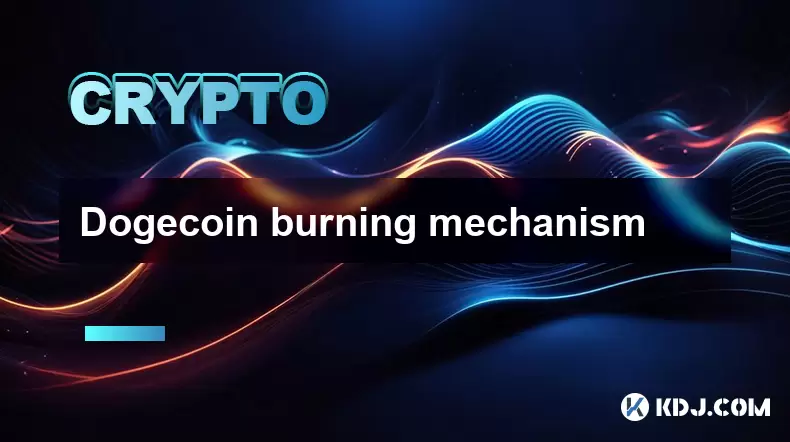
Bitcoincoin burning mechanism
Jul 20,2025 at 09:21pm
What is the Dogecoin burning mechanism?The Dogecoin burning mechanism refers to the process of permanently removing DOGE tokens from circulation by se...

How to earn free Bitcoincoin?
Jul 19,2025 at 10:08pm
What is Dogecoin and Why Earn It?Dogecoin (DOGE) started as a meme-based cryptocurrency in 2013 but has grown into a widely recognized digital asset. ...

Is Coinbase a good wallet for Bitcoincoin?
Jul 19,2025 at 04:42pm
Understanding Coinbase as a Wallet Option for DogecoinWhen considering where to store Dogecoin, Coinbase is often mentioned as a potential option due ...
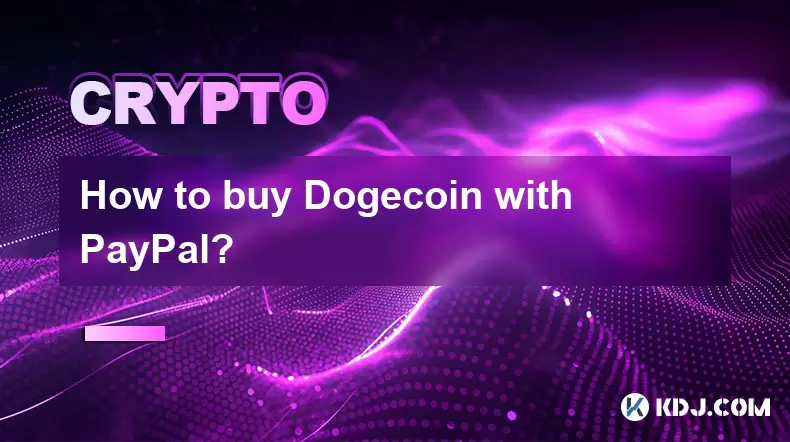
How to buy Bitcoincoin with PayPal?
Jul 23,2025 at 06:57am
Understanding the Basics of Buying DogecoinBefore diving into the process of buying Dogecoin with PayPal, it’s essential to understand what Dogecoin i...
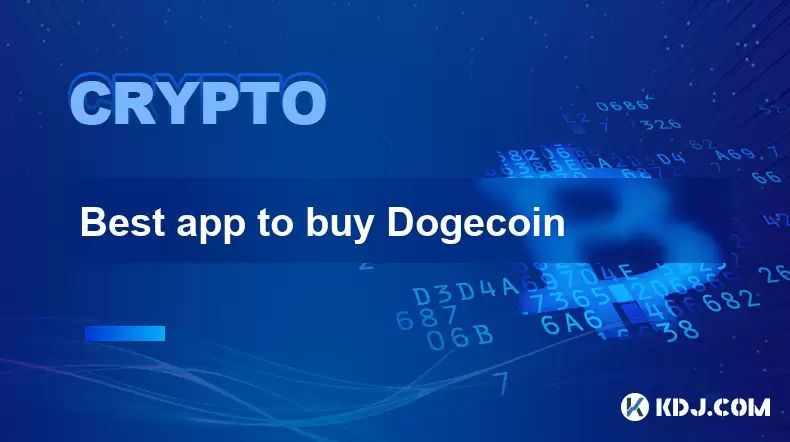
Best app to buy Dogecoin
Jul 23,2025 at 03:08pm
What Is a Cryptocurrency Exchange and How Does It Work?A cryptocurrency exchange is a digital marketplace where users can buy, sell, or trade cryptocu...
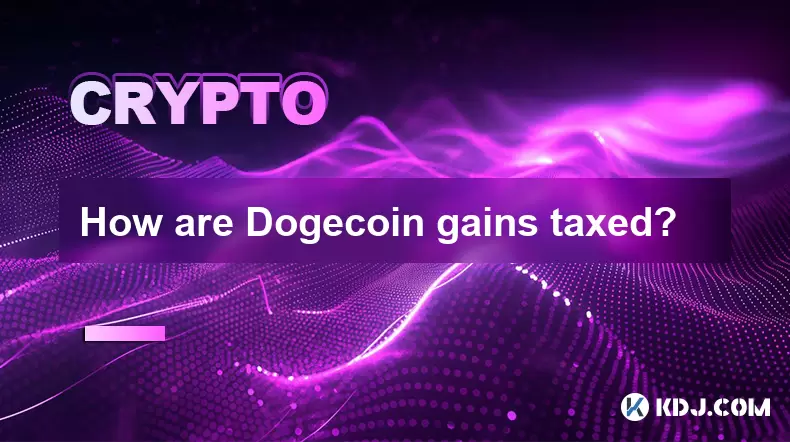
How are Dogecoin gains taxed?
Jul 25,2025 at 07:01am
Understanding the Taxation of Dogecoin GainsWhen it comes to Dogecoin (DOGE), many investors are drawn to its meme-inspired branding and volatile pric...

Bitcoincoin burning mechanism
Jul 20,2025 at 09:21pm
What is the Dogecoin burning mechanism?The Dogecoin burning mechanism refers to the process of permanently removing DOGE tokens from circulation by se...

How to earn free Bitcoincoin?
Jul 19,2025 at 10:08pm
What is Dogecoin and Why Earn It?Dogecoin (DOGE) started as a meme-based cryptocurrency in 2013 but has grown into a widely recognized digital asset. ...

Is Coinbase a good wallet for Bitcoincoin?
Jul 19,2025 at 04:42pm
Understanding Coinbase as a Wallet Option for DogecoinWhen considering where to store Dogecoin, Coinbase is often mentioned as a potential option due ...

How to buy Bitcoincoin with PayPal?
Jul 23,2025 at 06:57am
Understanding the Basics of Buying DogecoinBefore diving into the process of buying Dogecoin with PayPal, it’s essential to understand what Dogecoin i...

Best app to buy Dogecoin
Jul 23,2025 at 03:08pm
What Is a Cryptocurrency Exchange and How Does It Work?A cryptocurrency exchange is a digital marketplace where users can buy, sell, or trade cryptocu...

How are Dogecoin gains taxed?
Jul 25,2025 at 07:01am
Understanding the Taxation of Dogecoin GainsWhen it comes to Dogecoin (DOGE), many investors are drawn to its meme-inspired branding and volatile pric...
See all articles





















![Ultra Paracosm by IlIRuLaSIlI [3 coin] | Easy demon | Geometry dash Ultra Paracosm by IlIRuLaSIlI [3 coin] | Easy demon | Geometry dash](/uploads/2026/01/31/cryptocurrencies-news/videos/origin_697d592372464_image_500_375.webp)




















































